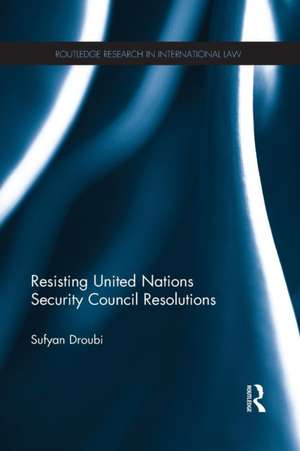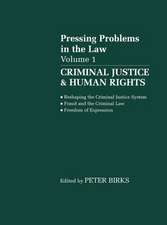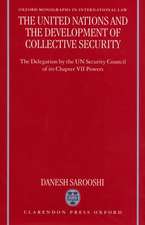Resisting United Nations Security Council Resolutions: Routledge Research in International Law
Autor Sufyan Droubien Limba Engleză Paperback – 3 mar 2016
This book analyses resistance to Security Council resolutions and puts forward a theory of lawful resistance. Sufyan Droubi takes a positivist approach to the UN Charter regarding it as a constitution. Special emphasis is placed on the construction of the Charter’s meaning through the practice of both organs and Members of the UN and on the need to enhance the effectiveness of the Organization with due respect to the rule of law. The book proposes that nonviolent resistance to a mandatory resolution of the Security Council, on grounds that the latter is incompatible with the Charter orjus cogensnorms, may be considered lawful under the Charter if some elements are present.
In exploring a number of case studies of individual and collective State resistance to mandatory Council resolutions, the book proposes that resistance may function as a rudimentary instrument of accountability and protection of the Charter and jus cogens, in the absence of more mature mechanisms of judicial review. The book will be of excellent use and interest to scholars and students of constitutional international law and international relations.
| Toate formatele și edițiile | Preț | Express |
|---|---|---|
| Paperback (1) | 414.82 lei 43-57 zile | |
| Taylor & Francis – 3 mar 2016 | 414.82 lei 43-57 zile | |
| Hardback (1) | 1057.75 lei 43-57 zile | |
| Taylor & Francis – 28 apr 2014 | 1057.75 lei 43-57 zile |
Din seria Routledge Research in International Law
-
 Preț: 296.42 lei
Preț: 296.42 lei -
 Preț: 151.71 lei
Preț: 151.71 lei -
 Preț: 311.94 lei
Preț: 311.94 lei -
 Preț: 311.70 lei
Preț: 311.70 lei - 8%
 Preț: 375.14 lei
Preț: 375.14 lei -
 Preț: 281.27 lei
Preț: 281.27 lei - 18%
 Preț: 1053.16 lei
Preț: 1053.16 lei -
 Preț: 484.47 lei
Preț: 484.47 lei -
 Preț: 282.62 lei
Preț: 282.62 lei -
 Preț: 410.46 lei
Preț: 410.46 lei - 18%
 Preț: 1054.75 lei
Preț: 1054.75 lei - 18%
 Preț: 727.38 lei
Preț: 727.38 lei -
 Preț: 422.04 lei
Preț: 422.04 lei - 18%
 Preț: 1054.71 lei
Preț: 1054.71 lei - 18%
 Preț: 1074.44 lei
Preț: 1074.44 lei - 18%
 Preț: 1059.48 lei
Preț: 1059.48 lei - 18%
 Preț: 1060.52 lei
Preț: 1060.52 lei - 18%
 Preț: 1058.43 lei
Preț: 1058.43 lei -
 Preț: 452.27 lei
Preț: 452.27 lei -
 Preț: 451.41 lei
Preț: 451.41 lei -
 Preț: 419.11 lei
Preț: 419.11 lei - 28%
 Preț: 822.34 lei
Preț: 822.34 lei -
 Preț: 494.07 lei
Preț: 494.07 lei - 18%
 Preț: 1118.46 lei
Preț: 1118.46 lei -
 Preț: 491.60 lei
Preț: 491.60 lei -
 Preț: 490.25 lei
Preț: 490.25 lei - 18%
 Preț: 1178.15 lei
Preț: 1178.15 lei -
 Preț: 444.62 lei
Preț: 444.62 lei - 18%
 Preț: 1050.78 lei
Preț: 1050.78 lei -
 Preț: 454.22 lei
Preț: 454.22 lei - 14%
 Preț: 301.05 lei
Preț: 301.05 lei -
 Preț: 419.32 lei
Preț: 419.32 lei - 18%
 Preț: 1052.38 lei
Preț: 1052.38 lei - 18%
 Preț: 1111.87 lei
Preț: 1111.87 lei - 18%
 Preț: 1112.34 lei
Preț: 1112.34 lei - 15%
 Preț: 550.99 lei
Preț: 550.99 lei - 18%
 Preț: 1054.71 lei
Preț: 1054.71 lei -
 Preț: 422.91 lei
Preț: 422.91 lei -
 Preț: 286.51 lei
Preț: 286.51 lei - 18%
 Preț: 1117.88 lei
Preț: 1117.88 lei
Preț: 414.82 lei
Nou
Puncte Express: 622
Preț estimativ în valută:
79.37€ • 83.10$ • 65.68£
79.37€ • 83.10$ • 65.68£
Carte tipărită la comandă
Livrare economică 07-21 aprilie
Preluare comenzi: 021 569.72.76
Specificații
ISBN-13: 9781138670518
ISBN-10: 1138670510
Pagini: 312
Dimensiuni: 156 x 234 x 14 mm
Greutate: 0.42 kg
Ediția:1
Editura: Taylor & Francis
Colecția Routledge
Seria Routledge Research in International Law
Locul publicării:Oxford, United Kingdom
ISBN-10: 1138670510
Pagini: 312
Dimensiuni: 156 x 234 x 14 mm
Greutate: 0.42 kg
Ediția:1
Editura: Taylor & Francis
Colecția Routledge
Seria Routledge Research in International Law
Locul publicării:Oxford, United Kingdom
Public țintă
PostgraduateCuprins
Introduction 1. The Powers of the United Nations Security Council and Resistance to its Resolutions 2. UN Charter as a Constitution and the Notion of Constitutional Resistance 3. South African Resistance to the Demands that it Abandon Apartheid and Withdraw from Namibia 4. Iraq's Resistance to Economic Sanctions, with Focus on its Opposition to the Implementation of Humanitarian Exemptions 5. Bosnia and Herzegovina's Noncompliance with the Arms Embargo 6. Libya's Noncompliance with Determinations for the Surrender of Suspects and Payment of Compensation 7. Iran's Noncompliance with Demands that it Suspend Nuclear Activities and Comply with the Protocol Additional to the Safeguards Agreement 8. Targeted Sanctions on Individuals Suspected of Terrorism 9. Critique of Prevalent Theories 10. Resisting the UNSC Resolutions Conclusion
Descriere
This book analyses States resistance to United Nations Security Council resolutions and puts forward a theory of lawful resistance. The book explores a number of case studies of individual and collective State resistance to mandatory Council resolutions, expressly justified by the alleged unlawfulness of the opposed resolution. The book develops the concept of lawful resistance including the cues of unlawfulness upon which the resisting State can rely so as to assess the lawfulness and legitimacy of its arguments, the role played by the different actors present in the different contexts of resistance, as well as the contours of behaviour that may qualify as lawful resistance.























